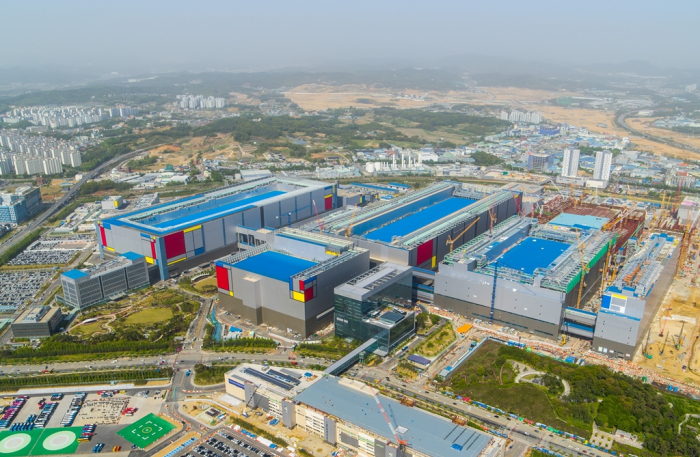Korean chipmakers
Samsung to spend $74 bn on chip production lines in Korea
The world’s No. 1 memory chipmaker plans to increase semiconductor facilities in Pyeongtaek to six lines
By Aug 23, 2022 (Gmt+09:00)
2
Min read
Most Read
LG Chem to sell water filter business to Glenwood PE for $692 million


Kyobo Life poised to buy Japan’s SBI Group-owned savings bank


KT&G eyes overseas M&A after rejecting activist fund's offer


StockX in merger talks with Naver’s online reseller Kream


Mirae Asset to be named Korea Post’s core real estate fund operator



Samsung Electronics Co., the world’s top memory chipmaker, is expected to invest some $74 billion to expand semiconductor production capacity in South Korea to meet growing global demand in the long term.
Samsung was known to have notified the local government of a plan to operate six production lines at its Pyeongtaek complex, the world’s largest semiconductor plant, according to industry sources on Tuesday.
The South Korean tech giant has recently started basic construction on the fourth facility in the complex located some 70 kilometers south of Seoul with a schedule to complete the third one in the second half, the sources said. The company could spend about 100 trillion won ($74.3 billion) to add three new production lines as it usually costs some 30 trillion won to build one.
The investment comes on the heels of Samsung Vice Chairman Jay Y. Lee unveiling a goal to become the world’s top system semiconductor maker by 2030.
“Samsung is predicted to expand production facilities as the global semiconductor market will gradually grow in the mid to long term, despite chip demand being hit by a slowdown in the electronics and IT sectors this year,” said an industry source.
TO PRODUCE 14 NM DRAM CHIPS, SYSTEM SEMICONDUCTORS
Last week, Samsung announced plans to spend 20 trillion won by 2028 on an advanced semiconductor research and development complex to secure a competitive edge in an intensifying battle against rivals such as Taiwan Semiconductor Manufacturing Co. (TSMC).
In the Pyeongtaek complex, Samsung is set to manufacture the industry’s smallest 14-nanometer DRAM chips using extreme ultraviolet (EUV) technology, and system semiconductors with 5 nm or smaller-size process nodes. All the production processes will be automated by smart control systems.
The company, however, plans to increase manpower for the semiconductor business. The number of employees for the sector rose to 63,902 last year from 52,095 in 2018, and that figure is expected to exceed 70,000 by the end of this year.
Samsung spent 43.6 trillion won on chip facilities last year, nearly double the 23.7 trillion won in 2018. The company is expected to continue to raise investment in the semiconductor business, although it has yet to unveil detailed spending plans.
Write to Shin-Young Park at nyusos@hankyung.com
Jongwoo Cheon edited this article.
More to Read
-
 Korean chipmakersSamsung to invest $15 bn in semiconductor R&D complex
Korean chipmakersSamsung to invest $15 bn in semiconductor R&D complexAug 19, 2022 (Gmt+09:00)
5 Min read -
 RoboticsSamsung Elec. plans unmanned factories on manpower shortage
RoboticsSamsung Elec. plans unmanned factories on manpower shortageAug 01, 2022 (Gmt+09:00)
4 Min read -
 Korean chipmakersSamsung to ramp up hiring for foundry business
Korean chipmakersSamsung to ramp up hiring for foundry businessJul 27, 2022 (Gmt+09:00)
2 Min read
Comment 0
LOG IN


